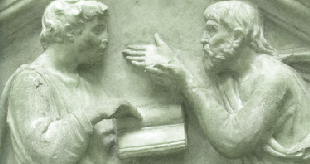Up down way: one and the same.
—Heraclitus, Fragment 60
What might Heraclitus have meant?
Heraclitus is one of the foremost of the pre-Socratic Greek philosophers. He lived some 2500 years ago, a few generations before Socrates, and his home was the city of Ephesus in Ionia, on the coast of Asia Minor (present day Turkey). He is said to have written a book, but his writings have been preserved only in fragmentary citations here and there; some of these so-called “fragments” seem more like aphorisms, self-contained and unified (though famously obscure) utterances that invite reflection.
But Fragment 60 seems at first glance relatively clear: one climbs to the mountain top and walks back down again on the very same path: a unity of opposites, one of Heraclitus’ favorite themes. He makes many observations about a world he finds constituted by a dynamic strife of opposites that may either conceal an underlying unity or disclose a higher unity. He describes the alternation of opposites over time (the seasons, for example) and also the ways in which the tension of opposites has creative power (the tension of the bowstring makes the bow effective, the tension of the string of the lyre enables the production of music).
But there is more to the story: Heraclitus introduces “Logos” as the governing principle of all things. Often logos means “word,” but it has a range of meanings and many translations: discourse, argument, meaning, proportion, rational principle, intelligibility. For Heraclitus Logos is the intelligible harmonizing principle that produces order in the ever-changing world of opposites at war.
Many commentators on Heraclitus’ thought, both ancient and modern, have seen him as first and foremost a cosmologist or proto-natural scientist, seeking to articulate the fundamental principles of the natural world: the universe is perpetually in flux; its basic element is fire; there is a rational lawfulness called “Logos” that governs and orders the interaction of opposites.
However, I don’t think this quite does justice to the profundity and scope of Heraclitus’ thought. Consider one of his best known fragments: “It is impossible to step into the same river twice.” This constant change, he goes on to say, applies to all mortal beings. But a related fragment states, “We both do and do not step into the same waters, we both are and are not.” It is a paradox of sameness and difference that applies to all mortal beings, ourselves included. We are both ever changing and yet the same.
Another fragment says, “I searched into my self.” But he warns, “You would not discover the limits of the soul even journeying far and wide — it has so deep a Logos.” As far as I know, it is Heraclitus who introduces in Western thought the metaphor of “depth.” He is also among the first to write about “soul” as the realm of introspection. He says, “To soul belongs Logos increasing itself.”
For Heraclitus, then, the fundamental principle of the cosmos is encountered in the depths that the introspective seeker explores in himself. The Logos belongs both to “the world” and to the soul. “The unmanifest harmony is stronger than the one that is apparent.”
In this light (dim though it may remain) Fragment 60 takes on additional meaning. The way to the fundamental principle of reality is twofold: an ascent to the heights — to a knowledge of nature, of gods, and of man — and an introspective journey into the depths of the soul. Heraclitus appears to declare that, different though these paths may be, they are nonetheless one and the same.

Comments are closed.